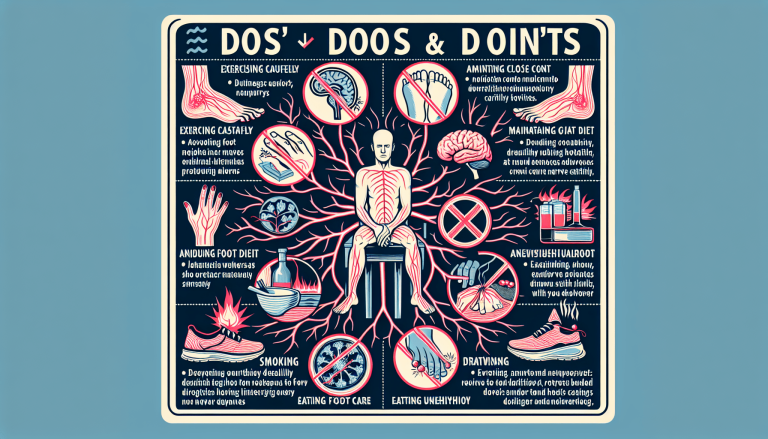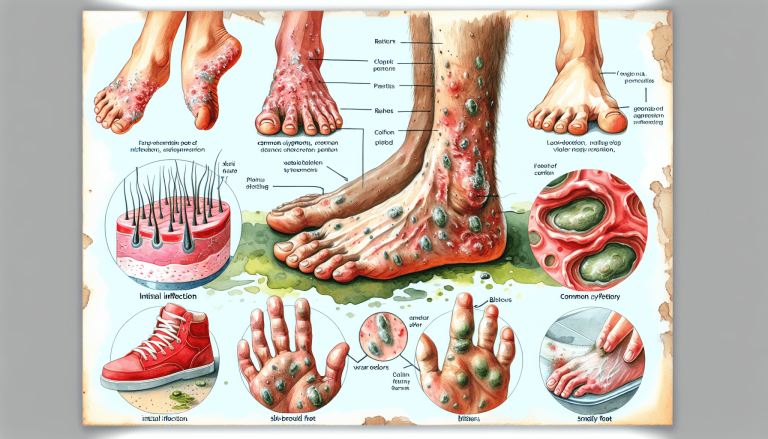What Are The Symptoms Of Severe Neuropathy?
You may have heard of neuropathy before, but do you know what the symptoms are when it becomes severe? Severe neuropathy can be incredibly debilitating and can affect various parts of your body. From numbness and tingling to sharp, shooting pains, these symptoms can greatly impact your daily life. In this article, we will explore the different signs of severe neuropathy, helping you understand what to look out for and when to seek medical attention. So, let’s dive into the world of severe neuropathy and uncover its symptoms together!

Pain
If you’re experiencing severe neuropathy, one of the key symptoms you may encounter is a burning sensation. This can be an intense and uncomfortable feeling that is often described as a tingling or pins-and-needles sensation. The burning sensation can occur in various parts of your body, such as your hands, feet, arms, or legs. It may come and go, but for some individuals, it can persist for long periods of time.
In addition to the burning sensation, you may also feel stabbing or shooting pain. This type of pain can be sudden and severe, often radiating from the affected area. It can be triggered by even the slightest touch or pressure, making it particularly challenging to cope with. This type of pain can greatly impact your quality of life and hinder your ability to perform everyday tasks.
Furthermore, the pain associated with severe neuropathy may worsen at night. Many individuals find that their symptoms intensify when they lie down to rest. The exact reason for this increase in pain during the nighttime is not fully understood, but it is a commonly reported symptom. This can lead to sleep disturbances and make it even more challenging to find relief and rest.
Loss of Sensation
Loss of sensation is another significant symptom of severe neuropathy. You may experience numbness or tingling in the affected area, which can greatly affect your ability to feel sensations. This can be particularly dangerous as it may lead to injuries or burns without your awareness. In addition to numbness, you may also notice a reduced ability to feel temperature changes. This means you may struggle to detect heat, cold, or even pain in the affected areas.
Loss of coordination and balance can also be related to severe neuropathy. The nerve damage can disrupt the signals that your brain sends to your muscles, leading to difficulty in movement and coordination. You may find it challenging to maintain your balance or perform tasks that require fine motor skills. This can greatly impact your independence and ability to carry out day-to-day activities.
Muscle Weakness
Muscle weakness is another troubling symptom associated with severe neuropathy. If you have this condition, you may experience difficulty in gripping objects, as well as weakness in the affected area. Tasks that were once effortless may become a struggle, impacting your overall functionality. In severe cases, muscle weakness may progress to the point where it affects your ability to walk or perform basic movements.
Additionally, severe neuropathy can also affect your fine motor skills. These skills involve the precise movements of small muscles, such as those in your hands and fingers. You may find it challenging to write, button clothing, or perform intricate tasks that require dexterity. The loss of fine motor skills can be frustrating and impact your overall productivity and independence.
Changes in Skin, Hair, and Nails
Severe neuropathy can also cause noticeable changes in your skin, hair, and nails. You may experience dry or cracked skin in the affected areas, as well as a general decrease in skin moisture. This dryness can lead to itchiness and discomfort. Furthermore, you may notice thinning hair, particularly in the affected areas. The hair follicles can be affected by the nerve damage, leading to hair loss or changes in hair texture.
Brittle or thickened nails are also common manifestations of severe neuropathy. The condition can disrupt the normal growth and development of nails, making them more prone to breakage or becoming thickened and misshapen. These changes may be particularly noticeable in the hands and feet.
Digestive Issues
Digestive issues can be an unfortunate consequence of severe neuropathy. Nausea and vomiting are common symptoms that can have a significant impact on your overall well-being. These symptoms can interfere with your ability to eat and may result in weight loss and malnutrition. Additionally, constipation is another common digestive issue experienced by individuals with severe neuropathy. It can cause discomfort and further impact your quality of life.
Loss of appetite is also a symptom that may be associated with severe neuropathy. The constant pain, discomfort, and digestive issues can make food unappealing and decrease your desire to eat. This can further exacerbate issues such as malnutrition and weight loss. It’s essential to address these digestive issues promptly to ensure your overall health and well-being.
Changes in Blood Pressure and Heart Rate
Severe neuropathy can impact your cardiovascular system, leading to changes in blood pressure and heart rate. Orthostatic hypotension, which refers to low blood pressure upon standing up, is a common symptom. When you stand up, your blood pressure may drop suddenly, leading to dizziness or lightheadedness. This can increase the risk of falls and injuries.

Tachycardia, which is a rapid heart rate, is another cardiovascular symptom associated with severe neuropathy. Your heart may beat faster than normal, even during periods of rest. This can cause palpitations and make you feel uneasy or anxious. It’s important to monitor your heart rate and blood pressure regularly to ensure your overall cardiovascular health.
Muscle Twitching and Cramps
Muscle twitching and cramps are often experienced by individuals with severe neuropathy. Involuntary muscle contractions can occur in the affected areas, causing visible twitches or spasms. These twitches may be unpredictable and can last for varying durations. Muscle cramps may also occur, leading to intense pain and discomfort. These symptoms can further impact your mobility and overall quality of life.
Sexual Dysfunction
Severe neuropathy can also impact your sexual health and function. In males, erectile dysfunction may be a challenging symptom to cope with. The nerve damage can affect the blood flow to the genital area, making it difficult to achieve and maintain an erection. In females, reduced vaginal lubrication may be a common issue. This can cause discomfort during intercourse and decrease sexual satisfaction. Additionally, a loss of libido, or a decreased interest in sexual activity, can also occur. It’s important to communicate openly with your healthcare provider about these symptoms to explore potential treatment options.
Difficulty Sleeping
Sleep disturbances are often reported by individuals with severe neuropathy. Insomnia, the inability to fall asleep or stay asleep, can be a frustrating symptom to manage. The constant pain and discomfort can make it challenging to find a comfortable position and relax. Restless leg syndrome, a condition characterized by an uncontrollable urge to move the legs, can also disrupt sleep. The pain associated with severe neuropathy can further disrupt sleep, leading to a cycle of sleep deprivation and increased fatigue.
Autonomic Symptoms
Autonomic symptoms may also accompany severe neuropathy. Excessive sweating, even without physical exertion or warm temperatures, can be bothersome and uncomfortable. Dry eyes and mouth are also common, which can be attributed to the disruption of nerve signals. You may also experience bladder and bowel problems, such as urinary incontinence or difficulty with bowel movements. These symptoms can greatly impact your daily life and require management and support.
Severe neuropathy can present with a wide range of symptoms that can significantly impact your quality of life. It’s important to seek medical attention if you experience any of these symptoms to receive an accurate diagnosis and appropriate treatment. With prompt management and support, there may be options available to help alleviate the symptoms and improve your overall well-being. Remember, you are not alone, and there are healthcare professionals ready to provide the necessary care and support.
Additional Resources

| This nerve pain breakthrough is backed by more than 213 clinical studies… And to date it’s changed the lives of more than 384,932 people living with burning and tingling feet. And all they had to do was…
1. Drink a single 8oz glass of water Sounds too simple, we know. A recent study of 1,149 patients found this improved the patients nerve pain symptoms by 69%… in only 3 weeks. And has since “dousing the flames” for thousands of folks with nerve pain. |







